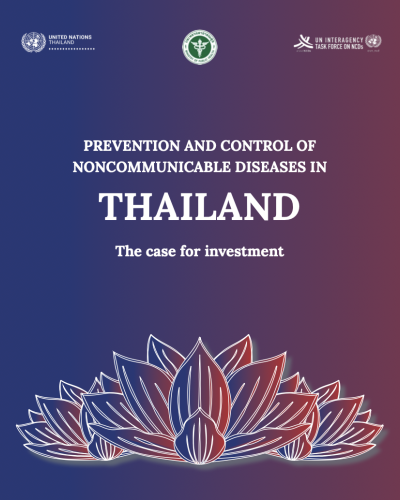
Prevention and Control of Noncommunicable Diseases in Thailand – The Case for Investment
Overview
Four Noncommunicable diseases (NCDs),- cancer, cardiovascular
diseases, diabetes and chronic obstructive pulmonary disease (COPD) - claim 400
000 lives annually and are responsible for 74% of all deaths in Thailand.
This “Investment Case” study has shown that NCDs not only have a
human and health cost, but also an economic cost. Currently, NCDs cost the Thai
economy THB 1.6 trillion annually, equivalent to 9.7% of its 2019 gross
domestic product (GDP). These costs include THB 139 billion to treat NCDs (9%)
and THB 1.5 trillion (91%) in lost productive capacity due to absenteeism,
“presenteeism” or early withdrawal from the labour force due to premature death
or disability. NCDs thus negatively affect socioeconomic development and the
long-term fiscal sustainability of Government and public services.
This report provides evidence that Thailand would benefit from
investing in key clinical interventions for the four most prevalent NCDs and in
four policy intervention packages that modify behaviour to address risk
factors. (tobacco use, harmful use of
alcohol, unhealthy diet and physical inactivity) and. The findings show that while
investments in NCDs are a matter of urgency, they will also ensure significant
social and economic returns. For example, an investment of THB 211 billion in the
implementation of the four suggested policy intervention packages plus clinical
interventions will save 310 000 lives and generate THB 430 billion in benefits
for the national economy in the next 15 years.

.pdf---adobe-acrobat-pro-dc-(32-bit).png?Status=Master&sfvrsn=949a07f_5)

_eng_tn.jpg?Status=Master&sfvrsn=198db18c_5)
_th_tn.jpg?Status=Master&sfvrsn=c31badbb_5)